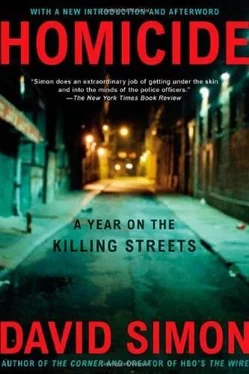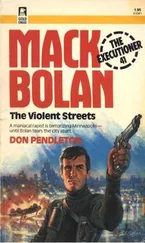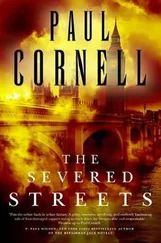“That’s the first thing you’re supposed to learn up here,” Eddie Brown later tells Ceruti. “No matter what, you always cover yourself in the case file. You write up everything so that no one can come back and second-guess what you did.”
In the end, it is not Landsman who brings the empty case file into the captain’s office; he is on vacation at the time and Roger Nolan is the supervisor assigned to handle the woman’s complaint. For that reason, Landsman will later insist to anyone who will listen that he played no part in Ceruti’s misfortune. That is true in only the strictest sense, of course. In fact, Landsman sent him out alone on those murders with an air of practiced noncommitment, waiting to see if his detective would stand or fall. Ceruti may have been wrong to think that his sergeant was out to screw him, but he was right to believe that, in the end, Landsman did little to save him from being screwed.
It is altogether sad and painful, particularly because Ceruti is a decent guy, an intelligent, good-humored addition to the homicide unit’s camaraderie. But by summer’s end, the complaints about the Stokes case will reach a natural resolution. The captain and D’Addario will keep Ceruti on the sixth floor, of course; they owe him that much, though such considerations are of small consolation to Ceruti. By September, he will be a vice detective, honing himself on whores and pimps and numbers runners in an office three doors down the hall from homicide. And the proximity alone will make for hard moments.
A week after the transfer, Ceruti is standing with another vice detective in the sixth-floor lobby when an elevator suddenly disgorges Landsman, who looks blankly at the detective.
“Hey, Fred, how’s it going?”
Ceruti stares angrily and Landsman moves past him, seemingly oblivious.
“You tell me,” asks Ceruti, turning to his companion. “How cold was that?”
THURSDAY, JUNE 30
“I hear what you’re saying,” Terry McLarney tells him. “I just don’t believe you really mean it.”
Worden shrugs.
“You don’t want to leave like this, Donald. You’d fucking hate it. You know you would.”
“Watch me.”
“No, you’re just pissed off. Give it time.”
“I’ve given it a lot of time. I’ve given it twenty-six years.”
“That’s what I mean.”
Worden looks at him.
“What else are you gonna do with yourself? You’d be bored shitless.”
Worden says nothing for a moment, then pulls out the keys to his pickup. “It’s getting late, Terry. Time to be heading down the road.”
“Wait a minute,” says McLarney, turning toward a brick wall at the edge of the lot. “I gotta take a leak. Don’t leave yet.”
Don’t leave yet. Don’t give up on a long, dangling conversation between two white men in rumpled suits, two refugees who have been standing in an empty parking lot off the 200 block of West Madison Street for more than an hour. It is three in the morning, and the two-story Formstone structure on the opposite side of the street, an establishment that trades as Kavanaugh’s Irish Tavern, sits dark and empty, having expectorated four or five homicide detectives more than an hour ago. The two white men are the only remaining patrons, and they have but one can of warm beer remaining. Why in the world would anyone even think of leaving?
“Listen to me, Donald,” says McLarney, returning. “This is your job. This is what you do.”
Worden shakes his head. “This is what I do now,” he says. “I can always change jobs.”
“You can’t change.”
Worden glares at his sergeant.
“I mean you don’t want to change. Why would you want to change? How many other people can do what you do?”
McLarney pauses, hoping that some of this-any of it-will touch a nerve. God knows he means every word of it. Worden was struggling, true, but even the man’s most mediocre year is worth any aggravation. For a squad sergeant, having Worden working for you was like having sex: When it was good it was great, and even when it wasn’t so hot, it was still pretty damn good.
In the last week alone, Worden proved as much by clearing two murders on nothing less than instinct and talent. He made it all look effortless and elegant, even as the stink of the Larry Young debacle was still hanging in the air.
Six days ago, Worden and Rick James caught a stabbing up on Jasper Street, a twenty-three-year-old black kid half-naked under bloody sheets in a second-floor bedroom. The two detectives took one look at their victim and knew immediately that they were dealing with a dispute between homosexual lovers. The depth and number of the stab wounds told them that much; no motive other than sex produces that kind of overkill, and no woman can make those kinds of holes in a man.
The body was already coming out of rigor. It was a humid night, and the temperature in that rowhouse had to be 110 on the upper floors: still, the two men refused to rush their scene. Several times, when the heat became too much for him, Worden stepped out onto the street and sat for a moment on the corner bench, sipping quietly on a convenience store soda. They stayed with that scene for hours, with James working the second floor and the area immediately surrounding the body. Worden wandered through the rest of the house, looking for anything out of place. In the third-floor bedroom, the killer had apparently yanked a VCR off its table and pushed the appliance halfway into a plastic garbage bag before giving up on the theft and fleeing. Was it really a robbery? Or was someone trying to make it look like a robbery?
Eventually, Worden got down to the kitchen, where he found the sink half-filled with dirty water. Reaching down gingerly, he pulled the drain and the sink emptied slowly, revealing a cutting knife with its blade broken. Lying next to the murder weapon was a hand towel still pink from the blood; the killer had washed up before leaving. Worden looked down the kitchen counter at a dozen or so unwashed dishes, glasses and utensils-jetsam, it seemed, from the previous night’s dinner. One glass, however, stood on the far edge of the counter, alone and distinct. Worden called the lab tech over and told him to check that glass in particular for prints. Hot as it was, Worden figured the killer might have wanted a drink of water before leaving.
The Jasper Street scene took five hours, after which James headed for the morgue and Worden locked himself in an interrogation room with the roommate of the victim, who also owned the house. The roommate had discovered the body after returning from his night job and told Worden that when he left to go to work, the victim was entertaining a friend he had met at a bar. He had never seen the guy before and didn’t know his name.
Worden rode the roommate hard, seizing on the fact that he was out working while his bunky was lazing around the house with some new man.
“You didn’t like that, did you?”
“I didn’t care.”
“You didn’t care?”
“No.”
“I know that would make me angry.”
“I wasn’t angry.”
The man held firm to his story and Worden was left with nothing, or so it seemed until later that afternoon, when the Printrak got a solid hit off the drinking glass. The latent print matched that of a twenty-three-year-old west-sider with a long sheet of priors. With considerable reluctance, the owner of the house returned once again to the homicide unit and made the ID of the suspect from a photo array. For that clearance, Worden’s eye-his ability to see that separate drinking glass as precious evidence-got the credit.
Four nights later, his remarkable memory sent another murder into the black when a tactical section officer locked up two east side men on auto theft charges and found that one of them, Anthony Cunningham, was wanted on a murder warrant written by Worden a month earlier. The warrant had been typed and signed shortly after detectives from the robbery unit locked up a crew of east-siders for a series of holdups centered around the Douglass Homes. Lew Davis, a long-time colleague of Worden’s in robbery, had wandered across the hall with the news.
Читать дальше












